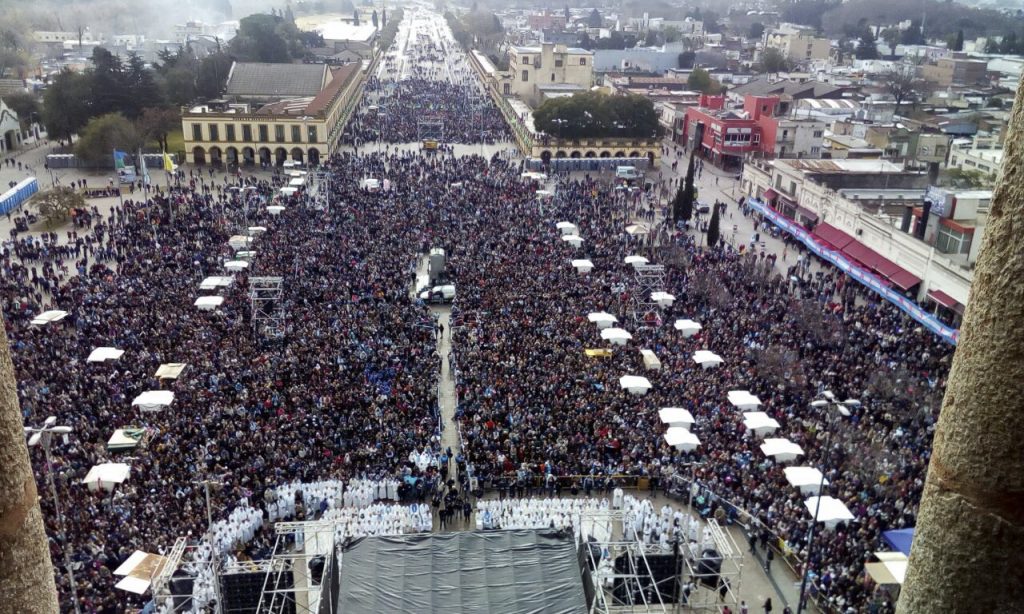After staying mostly on the sidelines while Argentina’s chamber of deputies was debating a permissive abortion law, the country’s bishops have made a sharp turn and are becoming much more outspoken as consideration in the country’s Senate progresses.
On Sunday, July 8, just before Argentina’s Independence Day and a month before its Senate is set to cast a vote on the abortion bill, the bishops celebrated a special Mass at the Shrine of Our Lady of Lujan, the patroness of Pope Francis’ native country and the nation’s most famous pilgrimage site.
Some 200,000 people are believed to have attended the celebration led by Bishop Oscar Ojea, president of the country’s bishops’ conference. Among the concelebrants was the papal representative in the country, Congolese Archbishop León Kalenga Badikebele.
“Abortion is not a right but a tragedy,” said Bishop Ojea, who was interrupted several times by people cheering.
The Mass, under the motto of “At your feet we renew our hope #TodaVidaVale,” [“Every life has value”] took place in the esplanade leading to the shrine.
Bishop Ojea said that as a Church, “we’re perplexed and hurt” by the proposed law, as it would mark “the first time in Argentina during democratic times that a bill legitimizing the elimination of one human being by another is passed.”
He urged legislators to “find new and creative solutions, so that no woman ends up turning to a choice that’s not the solution for anybody.”
“We know it’s not always easy to welcome life as it comes. Sometimes it presents itself in conflictive and distressing contexts,” he said. “Nevertheless, it’s always possible to care for and to defend that life.”
The bill under consideration would allow for abortion-on-demand until week 14, two weeks after the usual date for prenatal testing. Among other things, critics say this would amount to a form of eugenics, with babies diagnosed with a malformation or a condition such as Down syndrome being systematically eliminated.
In the United States, estimates are that between 67 to 90 percent of unborn babies diagnosed with Down syndrome are aborted. The rate goes up to 98 percent in Denmark and 100 percent in Iceland.
Nicolas Laferreire, director of the bioethics center of Argentina’s Catholic University, has spoken about this issue both in the chamber of deputies and in the Senate, arguing that abortion expands prenatal screening but “not with the intention to heal, but to eliminate” unborn babies who present difficulties.
“It is the most radical way of discarding the vulnerable: designing programs to detect people with disabilities prenatally in order to eliminate them before they are born,” he said on Thursday, July 12, addressing Argentina’s Senate.
He also said that health care providers could deny coverage to parents who refuse to terminate a pregnancy when a prenatal study showed problems, and doctors could face malpractice trials if they can’t persuade parents to have an abortion.
In addition, the proposed bill would allow a 16-year-old girl who was raped to have an abortion up until the ninth month of pregnancy, without informing either of her parents or the authorities.
Critics say this would help protect abusers, who would be less likely to face justice if they could arrange abortions for their victims without anyone knowing.
The bill passed by the chamber of deputies last month would allow for unrestricted “free, legal and safe” abortions until 14 weeks. The father’s consent for the procedure is considered unnecessary, and, if the “physical, psychological or social” life of the mother is at risk, she could request an abortion until the ninth month of pregnancy.
Many among those who defend the bill have accused the Catholic Church of trying to “pressure” the country, citing Sunday’s Mass and the two priests who addressed the chamber of deputies among some 700 exponents.
However, Church representatives say the pressure works the other way, noting that the bill would force privately owned Catholic hospitals to perform abortions, and that it only allows for individual conscientious objection, but not for institutions.
Dozens of Argentina’s major hospitals have already said that they would fight that requirement. Thousands of doctors have announced that they will object, and they’re denouncing that the proposed registry of conscientious objectors discriminates, as they argue it would eventually disqualify them for promotions and it could be used by health care centers as an excuse not to hire them.
As per the new bill, health professionals who refuse to perform an abor-tion could face up to five years in jail.
More than 2,000 lawyers from all over Argentina presented a formal complaint about the bill to the Senate, arguing that it’s unconstitutional because Argentina’s constitution defines conception as the beginning of life.
In addition, more than 700,000 signatures had been presented to the chamber of deputies, asking for a different bill that would protect the lives of both the mother and child.
The legalization of abortion in Pope Francis’ home country could cause reverberations across Latin America, where the procedure is largely illegal.
President Mauricio Macri, who allowed for the debate earlier this year, has stated on several occasions that he’s against abortion, but he’s also announced that he wouldn’t veto the bill if it were to pass.

